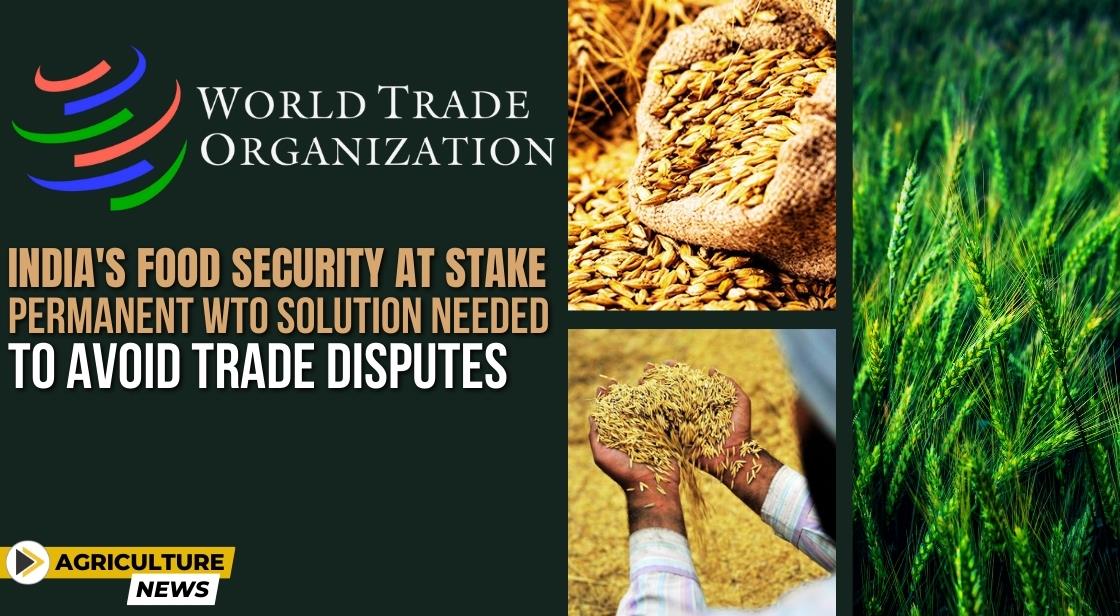India's Food Security at Stake: Permanent WTO Solution Needed to Avoid Trade Disputes

News Synopsis
As India gears up for the 13th ministerial conference in Abu Dhabi, trade experts and former negotiators caution that the nation could be vulnerable to trade disputes at the World Trade Organization (WTO) unless it secures a permanent solution on public stockholding for food grains. The outcome of this conference holds critical implications for India's farm support policies and its ability to navigate global trade challenges.
Importance of a Permanent Solution
A permanent solution at the WTO would provide India and a coalition of developing countries with the flexibility to offer higher farm support. This is particularly significant as farmers protest in the national capital, advocating for a law to guarantee a minimum support price (MSP) for all crops. The quest for a lasting solution aligns with the ongoing debate within India about its continued participation in the WTO.
Cairns Group Pushback and Global Concerns
India already faces resistance from the Cairns Group, comprising agricultural exporting countries such as Australia, Brazil, and Canada. This group asserts that India's public stockholding (PSH) program, especially for rice, is highly subsidized, impacting the food security of other nations. The pushback intensifies as the Cairns Group advocates for a 50% reduction in agricultural support by 2030, posing challenges for India and other developing nations.
Ambiguities in the 'Peace Clause'
One of the main drivers for India's pursuit of a permanent solution is the ambiguity in the provisions of the 'peace clause.' Abhijit Das, an expert on international trade, highlights the uncertainty arising from the interpretation of these provisions by a WTO panel. India has invoked the 'peace clause' multiple times, especially regarding the 10% subsidy ceiling on rice procurement.
Conditions for Dispute Avoidance
The 'peace clause' allows countries to breach the 10% subsidy ceiling without legal action, provided certain conditions are met. However, the conditions, including not hurting the food security of other nations or distorting trade, are considered vague. Ranja Sengupta, Senior Researcher at Third World Network, emphasizes that these vague conditions make India susceptible to disputes and underscores the need for a permanent solution.
Stalemate in Agriculture Negotiations
The divergence between developed and developing nations on domestic support for farmers persists, leading to a stalemate in agriculture negotiations. The WTO Director-General, Ngozi Okonjo-Iweala, acknowledged in November last year that the ongoing negotiations have "failed to achieve" the desired progress.
India's Firm Stand on Permanent Solution
Government officials assert that India will not engage in discussions on other agricultural issues until a permanent solution on public stockholding is achieved. The resolve reflects the nation's commitment to addressing the core concerns affecting its agricultural policies and global trade relationships.
Uncertain Future: WTO Negotiations Stalled:
The current lack of progress in WTO negotiations on agriculture, highlighted by Director-General Ngozi Okonjo-Iweala, further complicates the situation. Reaching a permanent solution requires cooperation and compromises from both developed and developing nations to ensure a balanced and sustainable approach to food security and trade.
Looking Ahead:
India's quest for a permanent solution at the upcoming WTO ministerial conference holds significant implications for farmers, trade relations, and global food security. Finding a solution that addresses trade concerns while ensuring food security for developing nations remains a critical challenge requiring collective efforts from the international community.
In conclusion, India faces a pivotal moment at the WTO ministerial conference, where securing a permanent solution becomes paramount for navigating trade challenges, ensuring food security, and maintaining its stance on farm support policies. The global dynamics of agriculture negotiations further underscore the urgency for meaningful progress in resolving these crucial issues.









